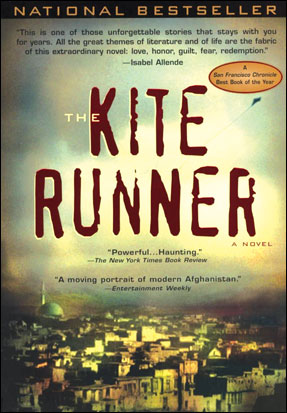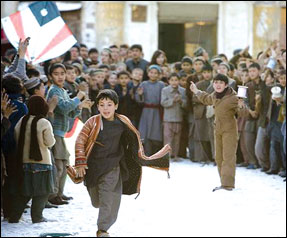|
|
| |
 |
The
Kite Runner***
*ing: Khalid Abdalla, Atossa Leoni, Ahmad Khan Mahmidzada and Shoun
Toub
Directed by Marc Forster and based on the novel by Khaled Hosseini
Tagline: There is a way
to be good again
|
| |
The
Kite Runner is a story of two friends, two brothers, two pomegranates
on a single branch in a blossoming tree that Kabul once was. It is
the devastating tale of Amir and Hassan, two children, who somehow
cross the boundaries of everyday friendship into a bond bordering
on almost servitude, yet irrevocably fail each other when that friendship
is put to test.
But the film is much more than just a story about Amir and Hassan.
It is a sad reminder of what Afghanistan once was - an Afghanistan
where John Wayne films were played in a Dari tongue in movie theatres,
where the Bamiyan Buddha statues were a regular Hippie attraction,
where the smells of kebabs in the bustling Peshawar-like bazaars cooked
up a furious appetite and where colourful kites soared into the Kabul
sky, against alluring sounds of rubabs and sarangis.
Amir is a child being brought up in a privileged family in the city
of Kabul and Hassan is his Hazara servant - Hazara being a downtrodden
race in Afghanistan. But both have a strong friendship. They run around
the streets of Kabul together. They carve themselves lofty titles
- 'The Sultans of Kabul'- on a pomegranate tree in their favourite
spot. They share stories with each other. Amir, the narrator, Hassan,
the devout listener.
|
 |
| |
Though
Amir is a sweet natured boy, he still cannot manage to get the attention
of his lion-hearted and extremely social father, who seems to admire
Hassan's tough, humble tenaciousness much more than Amir's delicate
sensibilities and writing abilities.
The kite flying competition is something Amir has been looking forward
to. He would give anything in the world to break his father's record,
the previous kite flying champion, and in the process, win his affections.
And that is exactly what happens, to his delight and joy. Amir's kite
is the last one soaring as he is able to cut all others and Hassan,
who is a skilled kite runner, runs to catch the last cut kite for
Amir according to custom. |
| |
"For
you, a thousand times over," Hassan yells while running his heart
out.
But on his way to get the kite, Hassan comes across some neighbourhood
thugs, who demand him to give them the kite, or suffer the consequences.
Hassan refuses. 'The kite belongs to Amir,' he holds his ground. 'I
promised him the kite.'
He is then taught a gruesome, sinful lesson, a lesson which would
dishonour the most lewd man in Kabul. That too while Amir watches
from an alley, too scared to move, too frightened to help his faithful
Hassan.
As Hassan limps back out of the alley, Amir hides his cowardice under
the pretence of having seen nothing, asking Hassan where he had been.
'Nothing, let's go' Hassan says slowly while wiping his nose with
the back of his hand. |
 |
| |
Though Amir is just a child, he is never able to get over this betrayal.
And when Hassan keeps works with as much loyalty, bringing Amir his
breakfast and eagerly waiting to hear some more stories, the guilt
intensifies. The more Hassan dotes on Amir, the more Amir detests
Hassan. Till one day, the guilt becomes so all-consuming, that Amir
devises a plan to get rid of Hassan, just to remove the evidence of
his shocking betrayal. Hassan finally leaves the house with downcast,
bewildered eyes. |
| |
Amir grows up and the soviet invasion of Afghanistan takes place.
He leaves his country with his father forever, making America his
new home and settling down with a nice Afghan girl. He also proudly
publishes his first novel - a novel that shows no signs of his Afghan
roots.
Years after his marriage and during a routine day of dishwasher loading,
the telephone rings. It's Rahim Khan from Pakistan, his father's trusted
friend. Hassan is dead now, he is told, and his son, named Sohrab
after Amir and Hassan's favourite Persian hero, is alone in a dilapidated
orphanage. He needs a father figure. "There is a way to be good
again" reminds the wise Rahim Khan. |
 |
| |
Saving Sohrab becomes something much more than Amir could have bargained
for. The child is in the hands of an influential Taliban who has taken
a liking to him and will not give him up without a fight. Afghanistan
too is not that of his childhood. But even if it takes Amir his life
to get Hassan's son out of a now-dangerous Afghanistan, it will not
be too big a price to pay for his redemption.
Though the film is a pleasurable experience, it is not possible to
view The Kite Runner without a jaundiced eye if you have also read
the book. Many scenes from the book have been cut out, making it a
lot less emotional experience. To the disappointment of Pakistanis,
a very detailed description of Islamabad and Shah Faisal Mosque has
been cut out altogether. The music in the background reminds one more
of the Middle East than of Afghanistan. One wedding scene is perhaps
the most silly. According to Afghan culture, the bride and groom see
each other for the first time through a mirror under a veil. In reality,
such a custom entails little more than a shy glance, but in the film,
it even involves a peck on the cheek in front of the entire wedding
hall, which is excruciatingly out of cultural context.
But these irregularities are unavoidable when filmmakers are foreigners
who have to get to know a given culture in a short period of time.
Not to mention the fact that filming in Afghanistan was a dangerous
experience in itself, especially after Hassan's rape scene hitting
the nerves of many honourable Afghans, resulting in a couple of death
threats.
One has to reiterate here that The Kite Runner film is half the experience
the book is. The music is not very haunting. The acting is sweet,
but not brilliant. The last scene in the book where Sohrab, who previously
refused to talk, gives his first little smile when Amir runs a kite
for him, exclaiming, "for you, a thousand times over!" made
many people actually cry out a river. In the film, it barely does.
So for those who have read the book, The Kite Runner is relatively
disappointing. But for those who have not, the film gives you a very
good reason to go pick up the book.
– Maria Tirmizi
*YUCK
**WHATEVER
***GOOD
****SUPER
*****AWESOME
|
| |
|

